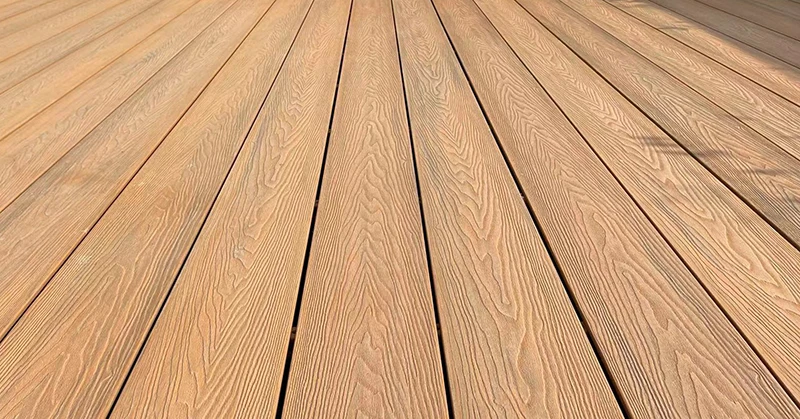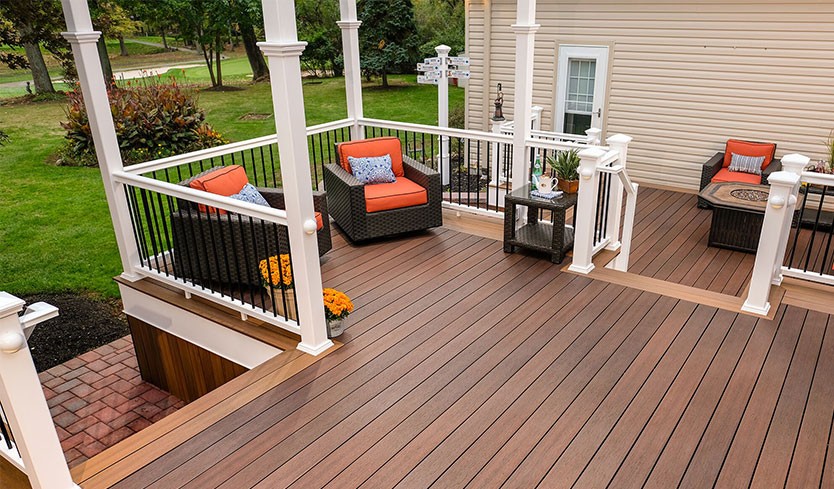In the quest for sustainable living, the choices we make in our homes play a crucial role. This article explores the eco-friendly aspects of composite decking, particularly Wood-Plastic Composite (WPC) decking, and provides insights into responsible disposal practices for old decking materials. From the recyclability of composite decking to environmentally conscious options for disposing of old decking, let’s embark on a journey towards a greener lifestyle.
Composite Decking: A Sustainable Alternative: Wood-Plastic Composite (WPC) decking serves as a sustainable alternative to traditional wood decking. Blending wood fibers and plastic, these decks not only replicate the texture and appearance of wood but also harness the durability of plastic. The fusion of materials creates a product that stands the test of time, with high-quality WPC decks boasting a potential lifespan of up to 30 years without the need for extensive maintenance.
Recyclability of Composite Decking: One of the key advantages of composite decking is its recyclability. While not all composite decks can be recycled, high-quality wood-plastic decks contribute to reducing environmental impact. The durable nature of these decks minimizes the need for frequent replacements, aligning with sustainable living practices. The combination of wood fibers and plastic results in a material with enhanced physical and chemical properties, creating a decking solution that is not only visually appealing but also environmentally conscious.
Sustainability in Decking Choices: The rise of WPC deck products in residential and commercial spaces, particularly in the ultra-low maintenance category, reflects a shift towards sustainability. Choosing wood-plastic composite decking not only delivers on performance and aesthetics but also aligns with a broader commitment to creating greener homes and lifestyles. At the heart of this movement is a shared concept of sustainability, emphasizing the importance of responsible choices in every aspect of our lives.
Environmentally Friendly Decking with FSC-Certified Materials: For a decking decoration to be truly “environmentally friendly,” it must undergo production processes that do not negatively impact the environment. This is where Forest Stewardship Council (FSC)-certified raw materials come into play. Hosung WPC, a leading composite decking manufacturer and supplier in China, prioritizes sustainability by selecting raw materials from FSC-certified trees. This commitment not only ensures recyclability but also promotes responsible forest management practices.
Addressing Forest Crisis through Recycling: In recent years, global forests have faced a crisis of scarcity due to human deforestation and inappropriate forest management. This crisis stems from policy mistakes, market failures, and imperfect institutional systems. To counteract these issues, the FSC, a non-profit organization, was established in 1993. Our composite decking, crafted from FSC-compliant raw materials, not only meets recyclability standards but also champions environmental friendliness.
Advantages of Recyclable Wood-Plastic Floors: Recyclable wood-plastic floors, meeting FSC standards, bring several advantages over traditional solid wood floors:
- Reduced Forest Damage and Resource Waste: By opting for recyclable decking, you contribute to reducing forest damage and the waste of limited resources.
- Protection of Endangered Species and Ecosystems: Recyclable decking aids in protecting endangered species and maintaining the ecological function and integrity of ecosystems.
- Promoting Sustainable Forest Development: Sustainable forest development is promoted as the use of recyclable materials helps maintain the ecological balance.
- Preservation of Biodiversity and Resources: Recyclable wood-plastic floors contribute to the protection of biodiversity, water resources, soil, and fragile ecosystems.
- Optimizing Forest Resource Use: The use of recyclable materials ensures that forest resources develop in the best direction, optimizing their use for long-term sustainability.
Recyclability and Reusing Recycled Materials: The recyclability of wood composites positions them as an excellent eco-friendly choice. At Hosung, we go one step further by incorporating recycled materials into some of our decking products. The manufacturing process of composite decking generates almost no waste, and the final product is free from toxic chemicals. This means that even scrapped decking doesn’t leave a negative impact on the environment.
Environmental Protection Industrialization: China, as the world’s second-largest wood consumer, faces challenges of limited resources and increasing resource consumption. The need to protect the ecological environment is evident, and the environmental protection industrialization of building materials emerges as a key solution. The one-time investment in products like wood-plastic composite decking, which can be recycled and used continuously, aligns with the goal of true environmental protection by saving resources and promoting sustainability.
Elevating Decking Products in a Green Market: In the current building market, consumer preferences are shifting towards green products. The environmental protection status of decking products has witnessed significant improvements. In a fiercely competitive market, wood-plastic composite decking stands out by meeting consumer expectations of health and environmental protection. This positions it for long-term development in a future market where sustainability is a driving force.
How To Dispose of Old Decking Responsibly: While embracing the benefits of composite decking, it’s equally important to consider responsible disposal practices for old decking materials. If you’re looking to get rid of your old decking, here are some eco-friendly options:
- Recycling Old Decking: Recycling remains one of the best options for decking disposal. Local recycling centers often accept wood waste, including old decking. Alternatively, specialized companies can be hired to collect and recycle old decking materials. Repurposing old decking for DIY projects is also a creative and sustainable option.
- Composting Old Decking: Composting old decking is a great way to reduce waste and improve soil quality. Chop the old decking into small pieces and add it to your compost bin. As it breaks down, it becomes part of the compost, providing valuable nutrients for your plants.
- Burning Old Decking: Burning old decking is an option but comes with potential risks. Check local regulations to ensure burning is allowed in your area. Take precautions to prevent fires by clearing flammable materials and having water nearby. While efficient, burning should be approached with caution.
Choosing Hosung as Your Decking Experts: As you embark on the journey of responsible decking choices, consider consulting with Hosung. While we don’t handle the removal of old decking, we offer a diverse range of wood-plastic composite decking options for your new decking needs. From traditional to contemporary styles, our team of experts can guide you in choosing the right decking for your home. We provide all the information you need to maintain your decking properly, ensuring a sustainable and stylish solution.
Conclusion: In conclusion, the transition from traditional wood decking to composite decking represents a significant step towards sustainability. Understanding the recyclability of composite decking and incorporating responsible disposal practices for old decking materials are crucial aspects of this journey. Whether you’re opting for wood-plastic composite decking that adheres to FSC standards or exploring eco-friendly ways to dispose of old decking, each decision contributes to a greener, more environmentally conscious lifestyle. As the market embraces green products, the future of decking lies in choices that prioritize health, environmental protection, and long-term sustainability.







